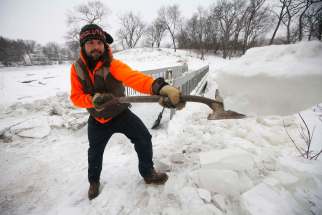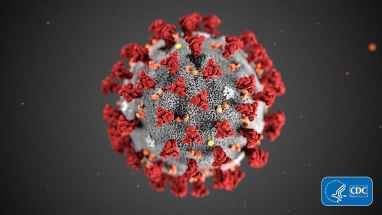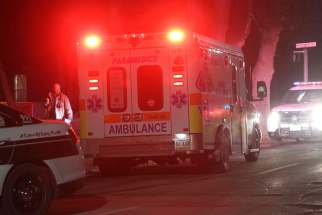Risk of novel coronavirus to Manitobans deemed low
Read this article for free:
or
Already have an account? Log in here »
To continue reading, please subscribe:
Monthly Digital Subscription
$0 for the first 4 weeks*
- Enjoy unlimited reading on winnipegfreepress.com
- Read the E-Edition, our digital replica newspaper
- Access News Break, our award-winning app
- Play interactive puzzles
*No charge for 4 weeks then price increases to the regular rate of $19.00 plus GST every four weeks. Offer available to new and qualified returning subscribers only. Cancel any time.
Monthly Digital Subscription
$4.75/week*
- Enjoy unlimited reading on winnipegfreepress.com
- Read the E-Edition, our digital replica newspaper
- Access News Break, our award-winning app
- Play interactive puzzles
*Billed as $19 plus GST every four weeks. Cancel any time.
To continue reading, please subscribe:
Add Free Press access to your Brandon Sun subscription for only an additional
$1 for the first 4 weeks*
*Your next subscription payment will increase by $1.00 and you will be charged $16.99 plus GST for four weeks. After four weeks, your payment will increase to $23.99 plus GST every four weeks.
Read unlimited articles for free today:
or
Already have an account? Log in here »
Hey there, time traveller!
This article was published 05/02/2020 (2135 days ago), so information in it may no longer be current.
Wash your hands, think logically, and don’t panic.
That’s a succinct summary of what a panel of experts in Winnipeg stressed Wednesday morning as the world continued to respond to the emergence of the novel coronavirus, an airborne pathogen the World Health Organization has deemed a high-risk public health emergency.
“The risk to Manitobans remains low,” Dr. Brent Roussin, the province’s chief public health officer, told about 50 people at a lecture hall at the University of Manitoba’s Bannatyne Campus.

According to the most recent report by the WHO, there have been a total of five confirmed cases of the virus in Canada, with no fatalities. Most of the cases confirmed thus far world-wide are in China, where the Hubei province and the city of Wuhan have been the hardest hit. In China—where over 1.4 billion people live—24,363 cases of the virus were confirmed as of Wednesday, with 491 fatalities.
In North America, there have been a combined 16 confirmed cases, with zero fatalities.
Roussin said that at this point, the province’s focus is largely centred on early identification, diagnosis, and treatment of the virus should it appear, and to prepare a wide-scale response should one become necessary.
“The larger risk to Manitobans remains influenza,” he said, encouraging those who haven’t yet done so to get their flu shots, to frequently wash their hands, and practice proper cough etiquette.
“The larger risk to Manitobans remains influenza.”–Dr. Brent Roussin
Roussin said that much of the attention toward this strain of coronavirus has been driven by the fact that it’s new; the initial novelty is not dissimilar to the 2009 anxiety over the H1N1 virus or the 2003 SARS outbreak. Because this coronavirus is not yet characterized, the province is taking extra precautions, he said.
But he and other panelists each reiterated the importance of remaining rational and informed to combat any sort of national mania, instead relying on evidence-based approaches to deal with any outcomes.
“We know fear and stigma can often be a pathogen’s greatest ally,” he said.
And that fear and stigma has been accompanied at times by unbridled racism toward Chinese and Asian people, similar to when SARS led to panic and anxiety 17 years ago.

Yiduo Zhao, a dental hygiene student at the U of M, told the audience that she hadn’t personally experienced that phenomenon, but that she’d seen online people wearing masks and mocking Asian people.
“There’s no reason to be wearing masks. It’s not effective.”–Dr. Brent Roussin
Asked whether masks are even needed, Roussin said that unless someone is sick or working in a health-care setting, “There’s no reason to be wearing masks. It’s not effective.”
Panelist Inez Vystrcil-Spence, a citizen of Nelson House, said this virus brought up memories of H1N1, when First Nations and Metis communities weren’t properly considered or involved in the institutional response.
Nearly 20 communities in Manitoba are fly-ins, and many still don’t have fully reliable or any running water, so advice about washing hands or seeking medical help if needed needs to address that discrepancy, she said.
Dr. Kevin Coombs, a professor of medical microbiology and the chair of the National Virology Panel, said the virus could be a flash in the pan, but it’s still important to remain vigilant and rational.
He pointed out that the fatality rate of the virus so far amounts to about two per cent, and that since the first case was confirmed, about 100 time as many people have died from influenza, with even more dying of tuberculosis or malaria.
Dr. Michelle Driedger, a professor in U of M’s department of community health sciences, said that clear communication would be essential as the situation evolves.

“The likelihood of the coronavirus causing anything catastrophic in Winnipeg approaches zero.” – Dr. John Embil
“The likelihood of the coronavirus causing anything catastrophic in Winnipeg approaches zero,” added Dr. John Embil, an infection control physician with the Winnipeg Regional Health Authority. “What we’re trying to do locally is reinforce basic approaches.”
The local health system, Embil said, has public-health protocols in place and the situation is being monitored.
“We have to maintain an element of common sense with everything we do,” he added.
ben.waldman@freepress.mb.ca

Ben Waldman covers a little bit of everything for the Free Press.
Our newsroom depends on a growing audience of readers to power our journalism. If you are not a paid reader, please consider becoming a subscriber.
Our newsroom depends on its audience of readers to power our journalism. Thank you for your support.


















